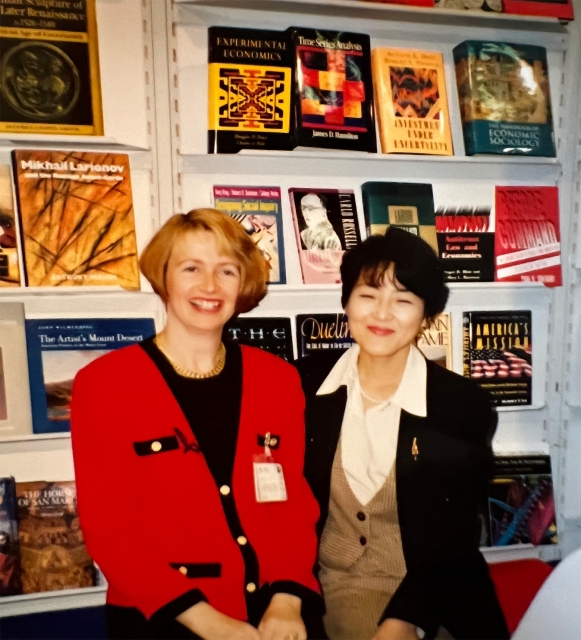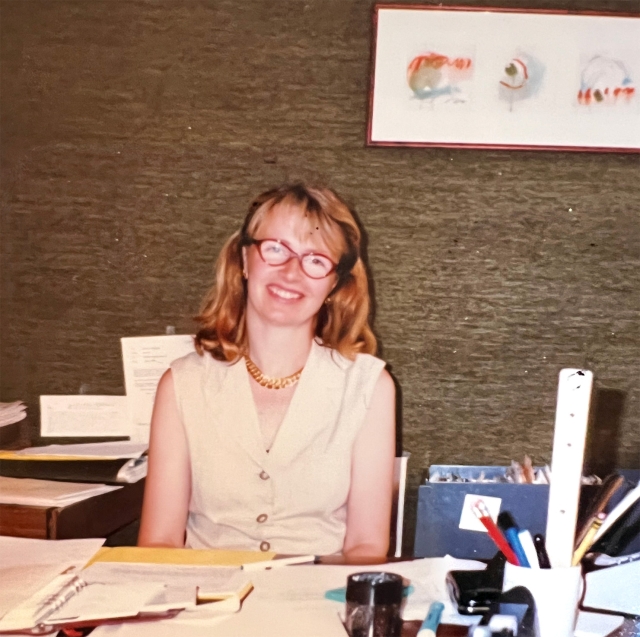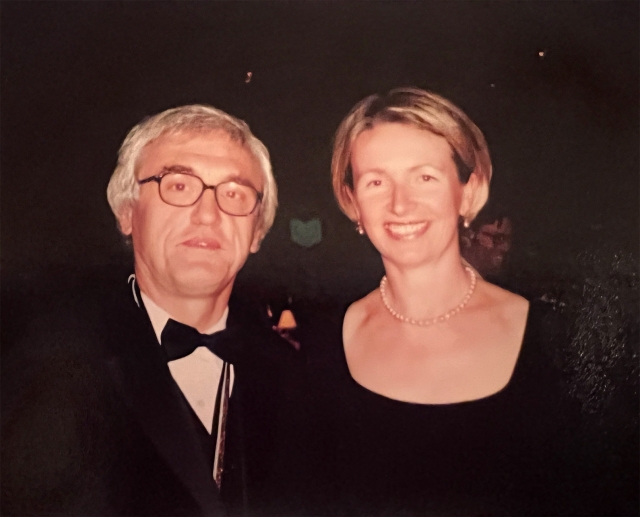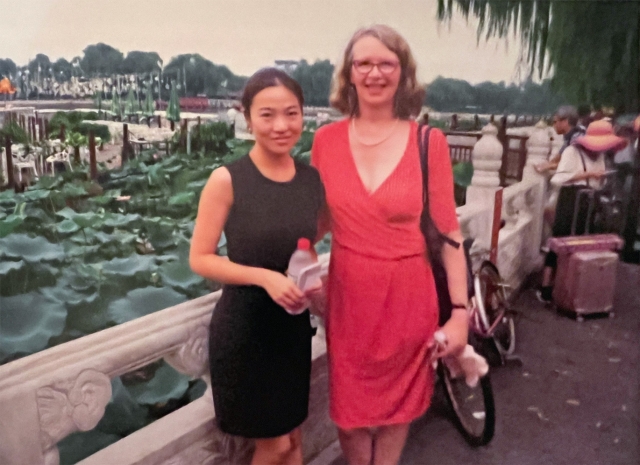I am often asked how long I have worked at Princeton University Press. When I respond, “37 years,” the reaction is sometimes one of surprise.
But in many ways, I have not really worked at the “same place” for all this time as PUP has gone through many evolutions since I first joined in January of 1987, eager to learn all about scholarly publishing as the Assistant to the Director of Sales.
I believe that Eric Rohmann hired me because he was impressed by a three-month internship at Herder Publishing House in Germany, because I passed the “typing test,” and because no doubt he thought that I must be organized and responsible (adhering to a common stereotype). I had just arrived from Germany a few months earlier, after finishing my graduate studies in history, so this was my first “real job.” Little did my boss know that every night I would take home the “memos” I had composed during the day to my American husband to look over to make sure they were written in proper “business English.” I had been recently married, and my new life in the U.S. was about to start. At work, computers were about to emerge, but email did not exist yet at PUP as a form of communication (it was introduced in 1991). All we had were typed “memos” and many phone calls. Pink message slips were ubiquitous, informing everybody about missed phone calls!
During my first years I learned about independent bookstores, set up new agency accounts (so they could get the necessary discounts), wrote the Press’s very first “author letters” (a revolutionary move back then, telling authors about the Press’s promotional activities), conducted “hurt book sales”, aka remainder sales, and sold our list to “catalogers,” mail order businesses that specialized in specific parts of our list. This was the early origin of today’s Special Sales and Grassroots Marketing (SSGRM).

It was at that time that I became intensely aware of the Press’s astounding backlist and its many gems. Selling Clausewitz’s On War, translated by Peter Paret and first published in 1976, to war and naval colleges in bulk all over the country, greatly impressed me, and I’m thrilled that we are now working on a revised paperback edition of this evergreen (a book that thrives in all seasons, and over many years), all part of our strategic backlist initiative. It was also during that time that I encountered the iconic Bollingen list. One of the many jewels was Joseph Campbell’s Hero With a Thousand Faces, originally published in 1949. It was in 1988, after the author was interviewed for a six-part series called The Power of Myth, that the book was catapulted onto the NYT bestseller list. Two major initiatives from this period were the Princeton Science Library (ongoing) and the Mythos series (now defunct, mainly Bollingen titles repackaged), both of which were my boss’s brainchild. Working closely with our paperbacks and reprints editor, who was then also part of the sales department, he created enticing packaging for both series so we could sell them in the retail space. Since we had neither a contracts manager, let alone an Intellectual Property department at the time, I also watched him deal with various thorny rights questions. What impressed me was the long and detailed letter he wrote to a British publisher, trying to sort out who owned what regarding our Bollingen list. I learned an enormous amount during these years, and, looking back, there is no doubt that working in the Sales Department laid the foundation for many of my own future ideas and initiatives at PUP. One of them, The Critical Edition of the Works of C.G. Jung, we just launched on April 1, 2024.
Like the proverbial cat that has nine lives, in the three decades that followed, I held various positions at the Press: Special Sales Manager, Rights and Permissions Director, History and Classics Editor, History and Religion Editor, Group Publisher, aka Editorial Director for the Humanities, Editor-in-Chief, and, for the last seven years Director of Global Development and Associate Director. Altogether, I spent the most significant part (1994-2017) of my career in editorial but am grateful for my “other lives” in sales and rights, as I believe they expanded my horizons in innumerable ways and created the foundation for my present role.
So what, you might ask, does the Director of Global Development do, which as far as I know, is a fairly unique position in University Press publishing? Answering this question entails a journey through PUP during the last thirty or so years.
The seeds of the global development idea were probably planted when I was working as Rights Director during the 90s and attending many a Frankfurt Book Fair. During conversations with editors from some of the most prominent publishing houses all over Europe, I noticed early on which of our titles “traveled well” and were attractive translation candidates on our list. Names like Richard Feynman (QED) and Charles Taylor (Multiculturalism) caught the immediate attention of those editors, whereas books from our very US focused political science list, or edited volumes, would cause them to turn the pages of the rights catalog quickly.

When I became the History and Classics Editor in 1994, I would oftentimes think of my previous roles at PUP. Two areas of focus emerged almost immediately as I took over from the previous editor: 1) I wanted to publish the best scholarly books that were at the same time accessible to a broader audience and sold well, the kinds of books that would do well during the Frankfurt Book Fair or in a bookstore setting. 2) I was wondering why we were publishing so few translations and how I could change that.
I should explain that at that point, the Press had no “trade” or “general interest” list to speak of and most of our lists were composed of monographs. During the Frankfurt Book Fair, I asked one of the editors from an eminent European publishing house what he thought of Princeton’s list. His spontaneous answer stung yet rang true: “dusty but venerable.” Ouch!
Well, that had to change.
At that time, a significant portion of our sales went to the institutional market although library budgets were already being cut and our sales to libraries had begun to shrink considerably. Independent bookstores were relatively strong, and Amazon was still in its infancy, although we were already somewhat under “attack” by Barnes and Noble (a development, captured in the 1998 movie You’ve Got Mail).
Previously, nobody in the editorial department had gone on campus trips, and most of my editorial colleagues relied on faculty advisors or waited for scholars to visit either Princeton University or the Institute for Advanced Studies. At that time, Press director Walter Lippincott had been in place for a few years already (1986-2005). Being keenly aware of the declining market for monographs and shrinking library sales, one of the two major changes he implemented were the publication of so called “trade books” and a radical reconfiguration of an editor’s role at the Press. Rather than sitting at their desks, he wanted the editors to visit all the major campuses in the U.S., talk to as many scholars as possible and actively look for manuscripts and start to commission books, based on our thorough knowledge of the fields we acquired in.
Miraculously, this coincided exactly with my own desire to publish a different type of book at PUP rather than the “dusty but venerable” monographs we were known for. I remember the rather daunting missive that ideally, we should all be on the road one week (!) out of every month, and there were indeed months where this was the case. It was all a big adventure for me, traveling all over the country to campuses, “interviewing” potential future authors, and learning about the ecology of the fields I was responsible for. Although I should add that traveling was not always easy, particularly with a toddler at home by now, a workplace where flexibility or attention to family matters was non-existent and “your own problem,” and where being pregnant was considered a “disability.” Fun fact: to the best of my knowledge, I was the first woman in the history of the Press to be pregnant and give birth (1991). Yet another marker of how life at the Press has changed, and all for the better!
Slowly, the Press’s publishing profile began to change, and these were heady and exciting years during which the Press became a much more dynamic and more modern organization as far as our publishing program was concerned. Alas, the announcement of our goal to publish more “trade books” was not universally greeted as a positive development and was in some corners of the academy seen as a betrayal of the Press’s scholarly mission. It was during this period that the Press also began building the kind of popular science, natural history, and economics lists that today form part of our core identity. I was thrilled that it was now part of the Press’s mission to publish books that had a broader readership and luckily, I was able to find many authors with whom this resonated.
Perhaps the boldest strategic move during that time was the establishment of PUPs European office in 1999 with an initial staff of three. It took many years until we established an editorial presence in the UK, and when I became Editor-in-Chief in 2006, I spent much of my time thinking about how these two offices could best work together. Looking at our recent 25-year anniversary celebrations this year, it feels that we have “arrived” and PUP Europe, with a staff of 25, has now become the major European publisher we set out to become many years ago.
It was during Peter Dougherty’s tenure (2005-2017), which roughly coincided with my role as Editor-in-Chief of the Press, that we first began to articulate most clearly the Press’s vision as premier global publisher of the best and field defining books in each discipline. Yes, some of the books we now published were trade books, but far from straying from our mission as academic publisher, these books were the very essence of our scholarly mission. Here, I was finally in a position to affect the kinds of changes in our editorial program that I could only dream of during my days in sales and rights: to publish books beyond a specialist market that would reach a broader academic audience, and in many instances a general audience. From the start, we articulated a global publishing strategy for both offices rather than seeing them as separate entities with separate publishing profiles, as is the case with Yale University Press for example.
We defined as cores strategies to acquire world English language rights for all our titles, including all global translation rights; commissioning books, and having a “balanced list” (meaning a list consisting of monographs, academic trade, trade, text and reference books). Coming up with ideas for commissioning books has been the hallmark of a successful Princeton editor, something that was especially important for those fields that were not naturally book producing fields, such as the sciences and economics. Finally, making all our lists more globally relevant and thus more saleable across the world was part of this effort, which was preceded by a thorough analysis of each of our lists.

During these years I remained the Press’s History Editor/Publisher, a position I held for 23 years (1994-2017). The History list I built reflects many of the core strategies and changes I have been describing here, and I am especially proud of having commissioned in the genre “big histories” as well as bringing many international authors to the Press in translation. Examples for the former are: Racism, A Short History (2002) by George Fredrickson, or Weimar Germany: Promise and Tragedy (2007) by Eric Weitz (full disclosure, the author of that book and I got married in 2011 after having worked together professionally for many years.). And probably the best example for a successful translation is Jürgen Osterhammel’s Transformation of the World: A Global History of the Nineteenth Century (2015), an important book for the Press’s global history list and a must read for all global historians. I published one book that influenced the political discussion about a country’s past and that is Jan Gross’s Neighbors, The Destruction of the Jewish Community in Jedwabne, Poland (2000) To my mind, publishing the brilliant The House of Government: A Saga of the Russian Revolution by Yuri Slezkine in 2017 provided the fitting capstone to my time as History Publisher at the Press.
The idea of creating an office in China was another major step in realizing our vision of a global university press. I’ve had the privilege of working with Lingxi Li, the Managing Director of our Beijing office, from the time we hired her in 2015, and officially when we opened the office in 2017, the year Christie Henry became Director of this Press. It was thrilling to celebrate the office’s five-year anniversary in 2022 and the inauguration of the Princeton Wenyan Lectures during this year’s Beijing Book Fair in June.

As you can see, the story of “global development” runs like a red thread through my time at the Press. Having three offices on three continents is only one aspect of it, albeit an important one; having a more global author pool, beyond Europe and the U.S., is another vital component of being a global university press, also from an equity and inclusion point of view. Two recent examples of just how powerful “local” authors can be in our international markets, are Rohit De’s A People’s Constitution: The Everyday Life of Law in the Indian Republic and Yi-Lin Chiang’s Study Gods: How the New Chinese Elite Prepare for Global Competition. Each book is a specialized monograph in the U.S. context; in its local context both became bestsellers in India and China respectively.
Being informed and keyed into our international partners’ publishing programs and being in touch with some of the major editors from similar minded publishing partners all over the globe, is another aspect of our global strategy. When I was Rights Director, I started visiting German publishing houses initially on my own initiative, intent on learning more about the reason for their success and meeting their editors. Today, our “market visits” are part and parcel of our rights strategy and our rights staff have visited publishers in Japan, Korea, China, Italy, Spain, France, Germany, Mexico, Turkey and many others. Here we can also engage our increasingly diverse staff, many of whom have global experiences in their lives and facility in many languages, which opens entirely new experiences for our team and our publishing. Examples of this throughout the Press abound and it is wonderful that we can nurture these connections.
Another important initiative that aims to make our lists more global is the Princeton Global Lecture initiative, which we inaugurated this June with the annual Princeton Wenyan Lectures, held at Peking University. This will soon be followed by the Latin American lectures, a collaboration with the Colegio de Mexico and the Princeton Latin American Studies Program. Our new collaboration with Planeta in the U.S. is another feature, as is our Global Publishing Fellowship program that brought a Brazilian editor to the press this Spring and gave all of us the opportunity for an exciting exchange, including with Princeton University’s Latin American Studies program.
Christie Henry’s leadership as Director has given us the chance to undertake the kind of lasting and significant cultural transformation that has inspired colleagues throughout scholarly publishing and beyond. In many ways, these last years have been the most joyful and creative period of my life at PUP, filled with so many amazing cross departmental collaborations, expansive external partnerships, new initiatives and innovations, too numerous to list here, and an atmosphere of kindness, a generosity of spirit, and constant and unwavering support that now defines us as much as our global publishing does.
During the last few years, working with the newly formed IP Department (another major innovation due to Christie’s support) on our various backlist initiatives has, in many ways, felt like a “homecoming” of sorts as this is how I started out in publishing many years ago.
Throughout, I have had the great fortune of working with some of the most inspiring and passionate publishing professionals in the industry—not to speak of the many wonderful authors—whom I encountered during my long tenure at PUP. It has been a privilege to bring ideas to the world and publish books that build bridges and forge partnerships across global and political boundaries.
Brigitta van Rheinberg is Associate Director and Director of Global Development at Princeton University Press.
